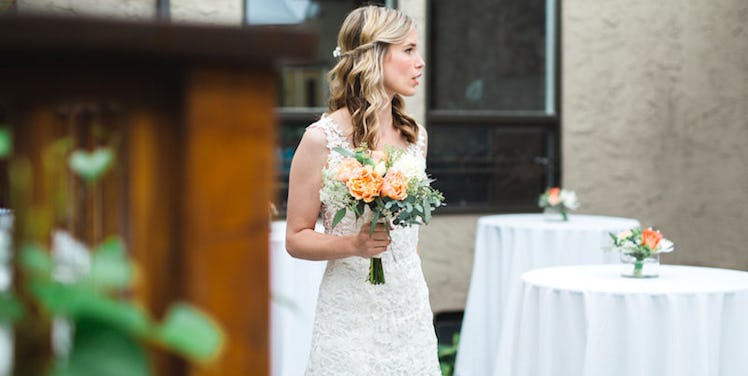
Why Choosing To Vaccinate My Kids Gives Me Greater Peace Of Mind
When I was pregnant with my first son in 2009, I was pretty nervous about making the decision to vaccinate.
At the time, the parents of a nine-year-old girl in Georgia, Hanna Poling, were making a case that her daughter’s autism was caused by a slew of vaccines she received at once.
TV host Jenny McCarthy was releasing a book she coauthored with Dr. Jerry Kartzinel called, “Healing and Preventing Autism.”
In it, she and Kartzinel proposed that vaccines, in their then-state, were unsafe and could be causing autism rates to go up.
In an interview with Time, McCarthy said,
“It shouldn’t be polio versus autism.”
As if first-time parents-to-be aren’t nervous enough already, this was, well, super scary.
I did what many of us do when we have a pivotal decision to make: I called one of my best friends.
One of my best friends also happens to be a family practice doctor, and she was a new mom at the time. I can’t think of someone I’d trust more to tell it to me straight.
She told me she strongly believes in vaccines. She had her daughter vaccinated according to the CDC recommendations.
She told me of a colleague she had who didn’t have his kids vaccinated; one of his kids has autism. Her point wasn’t that the colleague made the wrong decision. Her point was there were other causes of autism that weren’t vaccines.
Vaccines were designed to protect our kids.
That conversation was all I needed to decide to have my baby vaccinated.
At every pediatrician’s appointment, I read carefully about each immunization my son was getting. I watched closely for signs of reaction. I worried if he slept longer than usual after a shot. I breathed a sigh of relief when everything turned out fine.
About a year later, I became an editor at a parenting publication, so I was constantly following pediatric news.
Soon, news broke that the one and only study linking vaccines and autism, by Dr. Andrew Wakefield, was completely debunked.
The medical journal that originally published the study retracted it completely, saying it was not only inconclusive, but also unethical and incorrectly documented.
Parents who had chosen not to vaccinate because of autism fears had been misled. Jenny McCarthy’s statement could no longer be taken seriously.
Over the course of the next couple years, I would research, write and edit over a dozen articles on vaccines; I interviewed doctors, all of whom were pro-vaccine.
On top of all the evidence they cited – hundreds of studies on the effectiveness and overall safety of vaccines – almost all of the doctors are parents, too. They told me they vaccinated their kids.
And, so, during my second pregnancy, I was much more confident. When my OB-GYN asked if I wanted a Tdap (tenatnus, diptheria and pertussis – aka, whooping cough) vaccine, I said, “Sure. Can we do it today?”
Yes, there are sometimes complications to vaccines, and I can’t imagine how hard it must be for parents whose children have them.
Hanna Poling’s parents were awarded millions of dollars in court because she’d been given nine vaccines in one day (more than recommended), and they’d aggravated an undiagnosed mitochondrial disorder she had.
Both the CDC and American Academy of Pediatrics say severe reactions are “very rare.”
We all have different health concerns, religious beliefs and lifestyles, which we have to weigh when making the vaccine decision. There are also people who shouldn’t be vaccinated.
Everyone should talk to their doctors and to people they wholeheartedly trust, the way I did, to make the best choice for their families. Look closely at both sides, and know from where your information is coming.
Do what’s going to make you worry the least.
The way I see it, we’re lucky most of us haven’t seen polio, smallpox and rubella firsthand. And, as far as measles, mumps and other “more minor” illnesses go, people can die from complications to those, too.
I, personally, hate seeing my kids sick; hospitalizing a small child is an awful experience.
When we hear about whooping cough, measles and mumps outbreaks, they tend to happen in areas or communities where a relatively high percentage of people haven’t been vaccinated.
When I worked at parenting publications, our articles about vaccine recommendations tended to get an overwhelming number of anti-vaccine comments. I fully expect a ton of negative feedback on this article.
But, whenever I do an informal poll among friends and coworkers, the vast majority say they vaccinate. On top of everything else, daycares, schools and summer camps tend to require immunizations – and we like our kids to be able to go to them.
I don’t know why people who are pro-vaccine aren’t speaking out as loudly or as often as people who are anti-vaccine – even though there are more of us.
Maybe we’re afraid of offending someone. Maybe we feel for the parents of the kids who experience those very rare side effects.
But, when I hear about a communicable disease outbreak, I feel a little less scared for my kids.
And that’s enough to make me pro-vaccine.